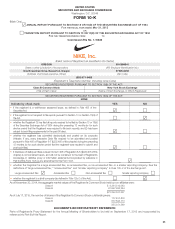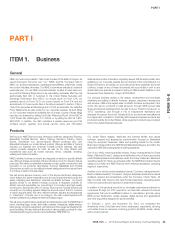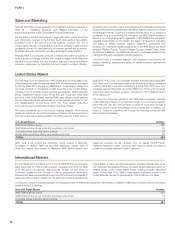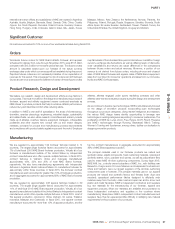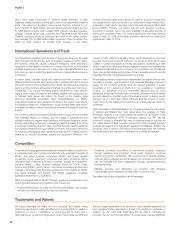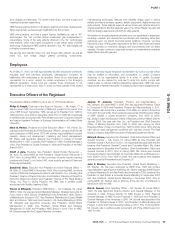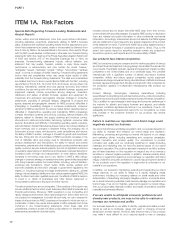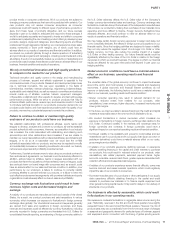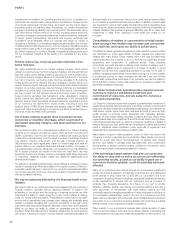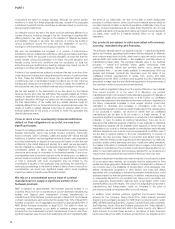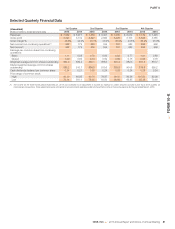Nike 2015 Annual Report Download - page 13
Download and view the complete annual report
Please find page 13 of the 2015 Nike annual report below. You can navigate through the pages in the report by either clicking on the pages listed below, or by using the keyword search tool below to find specific information within the annual report.PART I
corporations are taxed on foreign earnings. Although we cannot predict
whether or in what form these proposals will pass, several of the proposals
considered, if enacted into law, could have an adverse impact on our income
tax expense and cash flows.
Our effective income tax rate in the future could be adversely affected by a
number of factors, including changes in the mix of earnings in countries with
differing statutory tax rates, changes in the valuation of deferred tax assets
and liabilities, changes in tax laws, the outcome of income tax audits in
various jurisdictions around the world and any repatriation of non-U.S.
earnings for which we have not previously provided for U.S. taxes.
We and our subsidiaries are engaged in a number of intercompany
transactions across multiple tax jurisdictions. Although we believe that these
transactions reflect the accurate economic allocation of profit and that the
proper transfer pricing documentation is in place, the profit allocation and
transfer pricing terms and conditions may be scrutinized by local tax
authorities during an audit and any resulting changes may impact our mix of
earnings in countries with differing statutory tax rates.
Portions of our operations are subject to a reduced tax rate or are free of tax
under various tax holidays and rulings that expire in whole or in part from time
to time. These tax holidays and rulings may be extended when certain
conditions are met, or terminated if certain conditions are not met. If the tax
holidays and rulings are not extended, or if we fail to satisfy the conditions of
the reduced tax rate, then our effective tax rate would increase in the future.
We are also subject to the examination of our tax returns by the Internal
Revenue Service and other tax authorities. We regularly assess all of these
matters to determine the adequacy of our tax provision, which is subject to
significant discretion. Although we believe our tax provisions are adequate,
the final determination of tax audits and any related disputes could be
materially different from our historical income tax provisions and accruals. The
results of audits or related disputes could have an adverse effect on our
financial statements for the period or periods for which the applicable final
determinations are made.
If one or more of our counterparty financial institutions
default on their obligations to us or fail, we may incur
significant losses.
As part of our hedging activities, we enter into transactions involving derivative
financial instruments, which may include forward contracts, commodity
futures contracts, option contracts, collars and swaps with various financial
institutions. In addition, we have significant amounts of cash, cash equivalents
and other investments on deposit or in accounts with banks or other financial
institutions in the United States and abroad. As a result, we are exposed to
the risk of default by or failure of counterparty financial institutions. The risk of
counterparty default or failure may be heightened during economic
downturns and periods of uncertainty in the financial markets. If one of our
counterparties were to become insolvent or file for bankruptcy, our ability to
recover losses incurred as a result of default or our assets that are deposited
or held in accounts with such counterparty may be limited by the
counterparty’s liquidity or the applicable laws governing the insolvency or
bankruptcy proceedings. In the event of default or failure of one or more of our
counterparties, we could incur significant losses, which could negatively
impact our results of operations and financial condition.
We rely on a concentrated source base of contract
manufacturers to supply a significant portion of our
footwear products.
NIKE is supplied by approximately 146 footwear factories located in 14
countries. We do not own or operate any of our own footwear manufacturing
facilities and depend upon independent contract manufacturers to
manufacture all of the footwear products we sell. In fiscal 2015, five footwear
contract manufacturers each accounted for greater than 10% of fiscal 2015
footwear production, and in aggregate accounted for approximately 69% of
NIKE Brand footwear production in fiscal 2015. Our ability to meet our
customers’ needs depends on our ability to maintain a steady supply of
products from our independent contract manufacturers. If one or more of our
significant suppliers were to sever their relationship with us or significantly alter
the terms of our relationship, we may not be able to obtain replacement
products in a timely manner, which could have a material adverse effect on
our sales, financial condition or results of operations. Additionally, if any of our
primary contract manufacturers fail to make timely shipments, do not meet
our quality standards or otherwise fail to deliver us product in accordance with
our plans, there could be a material adverse effect on our results of
operations.
Our products are subject to risks associated with overseas
sourcing, manufacturing and financing.
The principal materials used in our apparel products — natural and synthetic
fabrics and threads, specialized performance fabrics designed to efficiently
wick moisture away from the body, retain heat or repel rain and/or snow as
well as plastic and metal hardware — are available in countries where our
manufacturing takes place. The principal materials used in our footwear
products — natural and synthetic rubber, plastic compounds, foam
cushioning materials, natural and synthetic leather, nylon, canvas and
polyurethane films — are also locally available to manufacturers. Both our
apparel and footwear products are dependent upon the ability of our
unaffiliated contract manufacturers to locate, train, employ and retain
adequate personnel. NIKE contractors and suppliers buy raw materials and
are subject to wage rates that are oftentimes regulated by the governments of
the countries in which our products are manufactured.
There could be a significant disruption in the supply of fabrics or raw materials
from current sources or, in the event of a disruption, our contract
manufacturers might not be able to locate alternative suppliers of materials of
comparable quality at an acceptable price, or at all. Further, our unaffiliated
contract manufacturers have experienced and may continue to experience in
the future, unexpected increases in work wages, whether government
mandated or otherwise and increases in compliance costs due to
governmental regulation concerning certain metals used in the manufacturing
of our products. In addition, we cannot be certain that our unaffiliated
manufacturers will be able to fill our orders in a timely manner. If we
experience significant increases in demand, or reductions in the availability of
materials, or need to replace an existing manufacturer, there can be no
assurance that additional supplies of fabrics or raw materials or additional
manufacturing capacity will be available when required on terms that are
acceptable to us, or at all, or that any supplier or manufacturer would allocate
sufficient capacity to us in order to meet our requirements. In addition, even if
we are able to expand existing or find new manufacturing or sources of
materials, we may encounter delays in production and added costs as a
result of the time it takes to train suppliers and manufacturers in our methods,
products, quality control standards and labor, health and safety standards.
Any delays, interruption or increased costs in labor or wages, or the supply of
materials or manufacture of our products could have an adverse effect on our
ability to meet retail customer and consumer demand for our products and
result in lower revenues and net income both in the short- and long- term.
Because independent manufacturers make a majority of our products outside
of our principal sales markets, our products must be transported by third
parties over large geographic distances. Delays in the shipment or delivery of
our products due to the availability of transportation, work stoppages, port
strikes, infrastructure congestion or other factors, and costs and delays
associated with consolidating or transitioning between manufacturers, could
adversely impact our financial performance. In addition, manufacturing delays
or unexpected demand for our products may require us to use faster, but
more expensive, transportation methods such as air freight, which could
adversely affect our profit margins. The cost of oil is a significant component in
manufacturing and transportation costs, so increases in the price of
petroleum products can adversely affect our profit margins.
In addition, Sojitz America performs significant import-export financing
services for the Company. During fiscal 2015, Sojitz America provided
financing and purchasing services for NIKE Brand products sold in certain
NIKE markets including Argentina, Uruguay, Canada, Brazil, India, Indonesia,
the Philippines, South Africa and Thailand (collectively the “Sojitz Markets”),
excluding products produced and sold in the same country. Any failure of
Sojitz America to provide these services or any failure of Sojitz America’s
banks could disrupt our ability to acquire products from our suppliers and to
74


